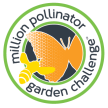
THE MILLION POLLINATOR GARDEN CHALLENGE
National Garden Clubs (NGC) is an Inaugural Network Partner in this Collaboration!
You can help protect and restore pollinator populations!!
National Garden Clubs (NGC) is an Inaugural Network Partner in this Collaboration!
You can help protect and restore pollinator populations!!

NGC has been invited to be an Inaugural Network Partner of the National Pollinator Garden Network, recently formed to help establish one million gardens to assist in restoring critical pollinator population recovery in the United States. Over the next two years, The Network will bring together the science and garden capabilities of industry with the outreach of nongovernmental organizations to empower a million private citizens and organizations to plant pollinator gardens nationwide.
Federal agencies have been directed to take steps to protect and restore pollinator populations due to recent declines in the number and distribution of pollinating insects causing significant concern among ecologists and agricultural interests. These declines include our managed bee population used in agricultural, native bees, monarch butterflies (suffering a decline of more than 90% over the past two decades), and many others. In addition to being important to natural ecosystems across our country, pollinators are critical to one third of our food production.
While there may be many reasons for pollinator decline, experts agree that the overall loss in the amount and distribution of habitat and food plants is a critical contributor.
You can be a part of this project:
Plant a Pollinators Garden - even if it's only in a container; then register your garden on: millionpollinatorgardens.org.
Pollinators Gardens Should:
Check out these websites for more information:
http://pollinators.wpengine.com/partners/
http://millionpollinatorgardens.org
Federal agencies have been directed to take steps to protect and restore pollinator populations due to recent declines in the number and distribution of pollinating insects causing significant concern among ecologists and agricultural interests. These declines include our managed bee population used in agricultural, native bees, monarch butterflies (suffering a decline of more than 90% over the past two decades), and many others. In addition to being important to natural ecosystems across our country, pollinators are critical to one third of our food production.
While there may be many reasons for pollinator decline, experts agree that the overall loss in the amount and distribution of habitat and food plants is a critical contributor.
You can be a part of this project:
Plant a Pollinators Garden - even if it's only in a container; then register your garden on: millionpollinatorgardens.org.
Pollinators Gardens Should:
- Use plants that provide nectar and pollen sources - Examples of these types of food sources can include flowering annuals and perennials, ground covers, shrubs, and trees.
- Provide a water source
- Be situated in sunny areas with wind breaks
- Create large “pollinator targets” of native or non-invasive plants
- Establish continuous bloom throughout the growing season
- Eliminate or minimize the impact of pesticides
Check out these websites for more information:
http://pollinators.wpengine.com/partners/
http://millionpollinatorgardens.org